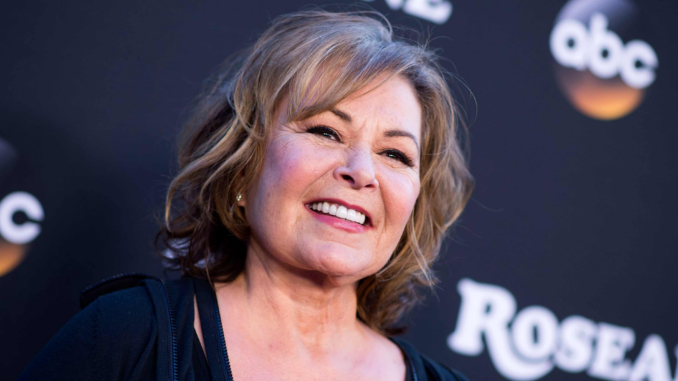
The reboot of the family sitcom has become a monster ratings hit but the off-screen views of its lead star continue to unsettle
The original series of Roseanne featured gay characters, cohabiting teenagers, women rebelling against sexist bosses and it was, for its time, shocking and progressive. It was also award-winning. Now, it’s back on ABC for an initial eight-episode run (a second series has already been commissioned). Why wouldn’t old fans like me herald the return of Roseanne?
The answer: Roseanne.
Roseanne Barr was known as a colorful character long before her show’s debut. But though some on the left might have found her behavior distasteful – crotch-grabbing after singing the National Anthem badly at a baseball game, for example – in general, she was regarded as a card-carrying, Obama-voting Hollywood liberal. Sometimes, an extreme one: she ran for president in 2012, losing the Green Party nomination to Jill Stein. Also in 2012, she tweeted the home address of the parents of George Zimmerman, the killer of Trayvon Martin.
But in the run-up to the release of the new show, it became apparent that Barr had changed sides. She’s embraced Trump and expressed far right views about everything from economics to immigration. She’s an enthusiastic retweeter (and sometimes deleter) of conspiracy theories, from Pizzagate to slurs about Palestinians to doctored photos of school shooting survivors doing Nazi salutes. And since the relaunch of the show, an old photoshoot of Barr dressed as Hitler baking cookies meant to represent Jewish people has been doing the rounds again on Twitter – Barr is Jewish, and the shoot was done for the satirical Jewish magazine Heeb in 2009, which maybe makes it slightly less antisemitic. But it was still in unquestionably bad taste.
After the debut of the show, the president himself called her with his personal congratulations – “It was very sweet,” Barr said – and claimed credit for the show’s ratings at a rally in Ohio: “They were unbelievable. Over 18 million people. And it was about us.” Sean Hannity promptly invited her to guest host his show. On the other hand, many on the left pointed out that Trump has failed to find time to call many other people, such as family members of victims of the Parkland shooting, families of military people fallen in combat, and his own secretary of state. His admiration of Barr is in keeping with his admiration of himself.
But does all of this mean that folks who loathe everything about the current president should boycott the new series on ethical grounds?
In 2018, Roseanne Conner, like her creator, is also a Trump supporter. But unlike Barr, her support of Trump is driven less by belief in rightwing conspiracy and more by the belief that he’d do more for her white, working-class Illinois family than Hillary Clinton. Does this normalize Trump supporters? Maybe.

Or maybe it gives a valuable and realistic glimpse into how families deal with politics in 2018. In the first episode, we learn that the rest of Roseanne’s family are not necessarily in agreement with her. She and her sister Jackie (Laurie Metcalf) have become estranged because of Jackie’s ardent support of Hillary Clinton. Darlene (Sara Gilbert) is also not on board with her mother in the political sense, but she’s been forced by the loss of a job and a husband to bring her two children back to live with her parents. Becky’s (Lecy Goranson) life has also not gone smoothly: her husband died, she’s working as a waitress because she didn’t graduate from college, and she’s trying to make money by serving as a surrogate mother to a woman who looks just like her (played by Sarah Chalke, who shared the role with Goranson throughout various seasons).
Watching the first three episodes of the reboot, I listened to the laugh track with suspicion: is the studio audience laughing with Darlene and Jackie or at them? Do their sympathies lie with Roseanne’s politics or simply her character? In the second episode, Roseanne and her husband Dan contend with their grandson’s gravitation to a sterotypically feminine wardrobe. Roseanne threatens the other kids at his new school if they bully him. Dan arms him with a knife (unrealistically, Mark is not expelled from school for this) but then concedes that it’s OK for young Mark to wear a skirt “but he really needs to wear underwear”. Their acceptance of Mark’s gender-fluidity feels like it harks back to old school Roseanne. On the other hand, the next episode features Roseanne and Darlene battling over the best way to discipline Darlene’s sassy teen daughter Harris. It culminates with Roseanne pushing her granddaughter’s head down in the kitchen sink and spraying her with water. Here, when the studio audience laughs, I cringe: maybe I’m a snowflake, but that strikes me as abuse.
“There’s Roseanne Barr and then there’s Roseanne Conner,” according to the showrunner Bruce Helford in an interview with the Hollywood Reporter. Roseanne Conner is just a white working-class grandmother who wants the best for her family; Roseanne Barr is a woman who exchanges admiring tweets with the president. This has included an endorsement of a disturbing pro-Trump conspiracy theory about what a New York Times writer sums up as “an inconceivably evil and powerful network of coup-plotters and child sex traffickers that includes Hillary Clinton, Barack Obama and George Soros”.
In time, this new series of Roseanne may well be regarded as a seminal example of Trump-era culture. In time, whether we regard the people who make it as creatives or colluders will also become clear.
